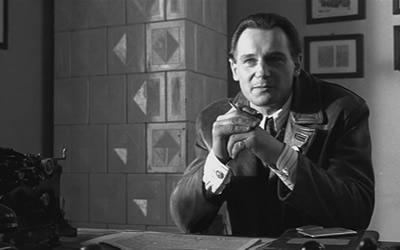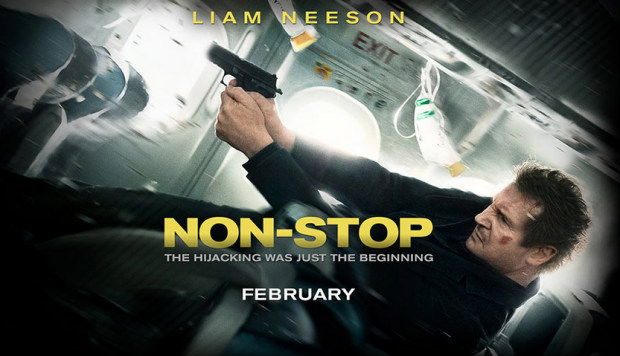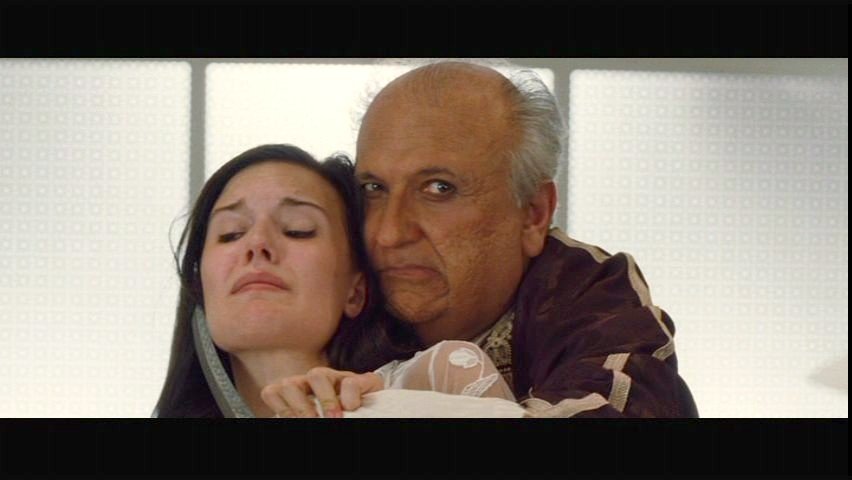Liam Neeson in the Flying Film “Non-Stop”
In February I reviewed the film Sully, a tale of White heroics on the Hudson River. Director Clint Eastwood cast Tom Hanks as Captain “Sully” Sullenberger and managed to keep the entire film a White affair.
Today I have a less profound flying film to play with, but still one with a pro-White perspective, which is reason enough to feel good inside. Hollywood does, after all, appeal to White audiences, at least some of the time. In this day and age even Thor can be played by a black actor, so when Hollywood hands us a treat, as they did with Sully, and now Non-Stop, we can sit back and enjoy it.
The plot of the film is totally preposterous, so accept that for what it is. We are, however, treated to a fine performance by Irish actor Liam Neeson, who has somehow been transformed over the years from a serious actor with serious roles to an action hero, albeit a good one. I know I sure didn’t see that coming when I watched him in the Steven Spielberg-directed Schindler’s List (1993).

Liam Neeson as Oskar Schindler
By the turn of the millennium, however, one began to see how Neeson had transitioned to an action character, playing Jedi Master Qui-Gon Jinn, the main character of the 1999 film Star Wars: Episode I – The Phantom Menace. A few years later, in K-19: The Widowmaker, he appeared as the executive officer aboard a Soviet nuclear submarine involved in a disaster, and in Batman Begins (2005) he was arch-villain Ra’s al Ghul.

I felt he had completed the transition to action character by 2008, when the first of three Taken films appeared. Wiki too notes that “Numerous media outlets have cited the film as a turning point in Neeson’s career that redefined and transformed him to an action film star.” As a retired CIA field operative named Bryan Mills, Neeson’s character chases bad guys who have kidnapped his daughter in Paris. As luck would have it, I reviewed the film seven years ago. See here.
One of my points in the review was that once again Hollywood was peddling the image of depraved, lustful Arabs. Some things never change.

Nabil Massad as Sheik Raman
Finally, we get to Neeson’s 2014 flying film Non-Stop (and here’s a useful trailer). Be warned: the following is full of spoilers.

In essence, Neeson’s character in Non-Stop, Bill Marks, is identical to his Taken persona, morphing from a CIA agent into an air marshal (and former NYPD cop). We meet him as he’s preparing for his latest assignment, guarding a flight from New York to London. To brace himself, this alcoholic pours a stiff drink, then boards his flight. To make a long story short, once in the air, Marks gets messages on his secure e-mail line that predict murders every twenty minutes until $150 million is transferred into a bank account. It turns out the account is in Marks’ own name, so the film becomes a thrilling whodunnit. Is it really Marks, or is there another killer on board?
The next four potential suspects are also White: Jen Summers (Julianne Moore), who has maneuvered her way into the window seat next to Marks; flight attendant Nancy Hoffman, who knows Marks and knows about his drinking problem; Austin Reilly, an active NYPD policeman; and Tom Bowen, a schoolteacher. Two non-whites are the Black computer whiz (surprise!) Zack White and a very dark flight attendant. Then to really raise our suspicions, there is Dr. Fahim Nasir, a physician wearing a Moslem prayer cap.
Before getting into the racial politics of the film, however, I must say I was surprised at how closely much of the plot of Non-Stop follows that of the 2005 flying film Flightplan, starring Jodie Foster. To begin with, both protagonists are bereaved, Marks having lost his daughter to a childhood illness, and Foster’s character Kyle Pratt having lost her husband to an apparent suicide. Next, the entire tension in each film revolves around the strong suspicion that the protagonists themselves are somehow to blame. The back and forth over this mystery occupies the broad middle of both movies.
A key factor in raising our suspicions about the protagonists is the discovery that money is the motive for the onboard hijackings, and the bank accounts in both films can be traced to the protagonists themselves. In Non-Stop Marks is an air marshal, but there is also a crooked air marshal aboard, one smuggling cocaine. Flightplan also features a crooked air marshal, who turns out to be the actual extortionist. Oh, both films give us suspicious Arabs — 9/11 and all that, I guess.
Oddly, I found no mention of these connections on the major sites discussing Non-Stop, instead finding only what looks like a personal blog here, which admittedly is insightful on both movies. In any case, by far the biggest shared characteristic of both films is their impossible-to-believe plots. Just accept that you will not find either film the least bit plausible. Then either sit back and enjoy them — or don’t.
Now, the reason I am doing this review for TOO is because of the race (and gender) politics of Non-Stop. As mentioned, it is pro-White just like Sully. This begins in the cockpit, where both pilots are White males, just as they are statistically likely to be in real life (in the 95% range for American commercial carriers). Next, the main characters are White — Neeson’s air marshal Bill Marks and Julianne Moore’s Jen Summers. Other Whites, as we just saw, include flight attendant Hoffman, teacher Tom Bowen, NYPD cop Reilly, as well as corrupt air marshal Jack Hammond.
Of the non-White cast, we have two Blacks — rude passenger Zack White and Kenyan actress Lupita Amondi Nyong‘o as a flight attendant. Like Ta-Nehisi Coates, senior editor at The Atlantic, Nyong’o has one of those names we’ll just have to get used to. After all, she is the first Kenyan to win an Academy Award, in this case as Patsey in the drama 12 Years a Slave (2013), for which she took home the award for Best Supporting Actress. In Non-Stop, however, her flight attendant character is a very minor role.

Lupita Amondi Nyong’o
As for Muslim doctor Nasir, he is provided merely to bait us, given all the stories swirling around perfidious Arabs in our world. Unlike the Arab in Flightplan, however, Dr. Nasir does not lecture us on our White American racist assumptions about Arabs. Refreshingly, Dr. Nasir is just a prop.
This leaves us with only computer genius Zack White to examine. While initially rude, he later renders service to Marks by showing his superior computer skills in trying to catch the killer. (As we all know, many, if not most, computer wizards in the real world are Black.) Is he going to emerge a hero? To my surprise, no. It turns out he, along with the White schoolteacher, are the ones responsible for the hijackings and murders, and they plan to parachute to safety while the rest of the crew and passengers die horrible deaths when a bomb they planted goes off.
Since this is an action movie, we next get plenty of action, as Marks engages in a fight with the two bad guys. Zack White, who only wants the money, attempts to exit the plane, but his more ideologically motivated partner shoots and wounds Zack. After some aerial acrobatics, Marks is able to kill the schoolteacher, whereupon Zack White attacks Marks and tries again to exit the plane. Marks, however, gets the better of him, and White dies at the back of the plane when the bomb he and his partner planted goes off, blowing open the door and killing White.
Like Greg Johnson has done with Trevor Lynch’s White Nationalist Guide to the Movies and Son of Trevor Lynch’s White Nationalist Guide to the Movies, I am trying to provide a list of White-friendly Hollywood films. Over the years, the bulk of my Hollywood coverage has been negative, in that I’ve endeavored to show how Jews in Hollywood have worked to undermine White civilization through sophisticated propaganda techniques. With the rise of the Alt Right, however, I’ve seen how White Nationalist critiques can be more positive, so I’m trying to offer more of that. I confess that it doesn’t come easy to me.
In conclusion, if you’re looking for something to watch on a dreary early spring day, you can order or stream Non-Stop and/or Sully. Both films have, in my eyes, earned the White Nationalist’s seal of approval, in contrast to so many others that have appeared in this millennium.





Comments are closed.